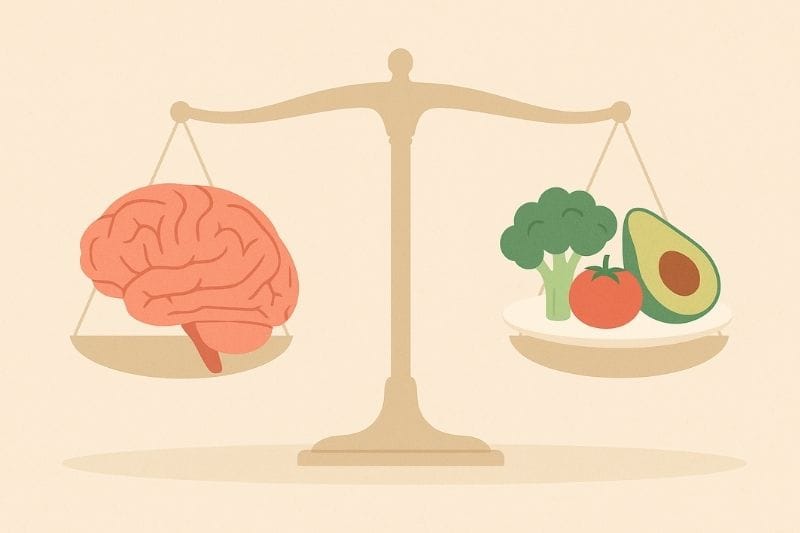If you have ever been on antidepressants and noticed your weight creeping up, you are definitely not alone. It is one of the most common worries people have when starting treatment. The truth is that some antidepressants can cause weight gain, but it is not guaranteed and it does not happen to everyone.
The link between antidepressants and weight gain is complicated. It is not as simple as “they make you put on weight.” A few different factors come into play, from brain chemistry to appetite changes, energy levels and even your mood itself.
If you are concerned about this topic, remember that my weight loss coaching clients have been in all sorts of positions and on many different medications, including antidepressants.
So, let’s look at what can happen.
Why antidepressants can lead to weight gain
There are a few main reasons why people may notice their weight go up while taking antidepressants, and they often overlap:
1. Changes in appetite and cravings
Many antidepressants work by affecting chemicals in the brain such as serotonin, dopamine and histamine. These are not only linked to mood, but also play a role in appetite and reward.
Some people find that antidepressants increase their appetite, especially for carbohydrate rich or “comfort” foods. Others say they just do not feel full as easily, which means they eat a little more without noticing.
This effect is more common with certain types of medication, such as SSRIs like sertraline, citalopram or fluoxetine, and some older antidepressants like mirtazapine or amitriptyline.
2. Improved mood and the return of appetite
This one catches a lot of people by surprise. When you are struggling with depression or anxiety, your appetite often drops. You may eat very little or lose interest in food altogether.
When antidepressants start to work and your mood begins to lift, your appetite can return to normal. In some cases, it can even rebound a bit higher for a while. That is not necessarily the medication “causing” weight gain, but your body trying to recover and restore balance after a period of restriction.
In other words, sometimes weight gain happens because you are finally eating properly again.
3. Subtle metabolic effects
Some medications can have a mild impact on your metabolism, affecting how efficiently your body uses glucose or fat for energy. It is usually a small change, but over several months, it can make a difference if your calorie intake increases even slightly.
This tends to be more common with older antidepressants rather than newer ones.
4. Tiredness and changes in activity
Fatigue is another factor that can quietly affect weight. Certain antidepressants can make you feel drowsy or low on energy. When that happens, it is easy to move less throughout the day or skip exercise.
If you are eating a little more and moving a little less, the balance can tip toward gradual weight gain even without any big changes in your habits.
How antidepressants influence eating behaviour
One of the most interesting effects of antidepressants is how they subtly change the way you experience food. When serotonin levels shift, food can feel more rewarding, especially foods that are warm, sweet or high in carbohydrates.
You might notice stronger cravings or more frequent snacking. Some people find themselves reaching for bread, crisps or chocolate more often, or feeling hungry again not long after a meal. These are not signs of weakness or poor willpower. They are gentle nudges from the brain’s reward system responding to chemical changes.
Being aware of these signals is helpful because it allows you to work with them instead of against them. Recognising the difference between real hunger and emotional comfort eating can go a long way.
Managing weight while taking antidepressants
The good news is that it is possible to manage your weight while on antidepressants. Many people do it successfully once they understand what is happening.
A few things that help:
- Eat balanced meals. Include protein, fibre and healthy fats at each meal to stay fuller for longer. This helps stabilise blood sugar levels and reduces cravings.
- Keep strength training. Lifting weights or doing bodyweight resistance work helps maintain muscle mass and a healthy metabolism, especially if your activity levels drop.
- Watch your routines. Try to keep regular meal times and a consistent sleep schedule. Fatigue often leads to mindless eating.
- Stay active in ways you enjoy. Even short walks, yoga, or cycling sessions can keep your mood and energy levels stable.
- Keep perspective. Small weight changes in the short term are normal and not always a bad thing. Your mental health and stability come first.
If you notice a significant or rapid change in weight that feels out of proportion, speak to your GP or psychiatrist. Sometimes adjusting the dose or switching to a different medication helps.
Which antidepressants are more likely to increase weight?
Everyone responds differently, but research and experience suggest that some medications are more likely to be linked with weight gain than others.
Medications like mirtazapine, paroxetine and amitriptyline are often associated with increased appetite and gradual weight gain. On the other hand, medications such as sertraline and venlafaxine tend to have a more neutral effect.
Again, that does not mean you will definitely gain or lose weight on any particular drug. The overall pattern depends on your lifestyle, mood, and how your body reacts to the medication.
Can some antidepressants cause weight loss?
Whilst this blog has focused on how antidepressants can increase weight and how to manage it, it is worth knowing that some antidepressants can have the opposite effect and lead to mild weight loss for some – especially in the early stages of treatment. This is usually because they reduce appetite or cause mild nausea at first, which can lead to eating less. It often evens out over time as your body adapts to the medication.
Fluoxetine (often known as Prozac) is the one most commonly linked with short-term weight loss, while bupropion (known as Zyban or Wellbutrin, though not prescribed as often in the UK for depression) is sometimes associated with longer-term weight stability or even slight loss.
However, this is not something that can be relied upon as a “benefit.” Everyone responds differently, and changes in appetite or weight tend to level out once your mood improves and your eating habits return to normal. The goal with antidepressants is always mental health first, not weight change.
The bigger picture
It can be frustrating when you are doing your best to look after yourself and the scales move in the wrong direction. But remember that antidepressants are prescribed for a reason. They can make a huge difference to quality of life, and for many people, the benefits outweigh any changes in weight.
Once your mood and energy are stable, it becomes much easier to focus on healthy routines, manage stress and make adjustments to your diet or training. Weight is only one part of the bigger picture of recovery and wellbeing.
If you are doing your best to look after your mental health and want to start feeling stronger, healthier and more comfortable in your body again, you do not have to figure it all out on your own. Get in touch for a chat and we can talk about what might help. You can book a free Zoom consultation here.
My weight loss coaching, and online personal training and fitness coaching, focus is on real life changes that actually fit around you. No extremes, no all or nothing plans, just simple steps that build confidence and make you feel more like yourself again.
Disclaimer: This article is for general information only and is not medical advice. If you are concerned about side effects or changes in your weight, speak to your GP or healthcare provider before making any changes to your medication.




